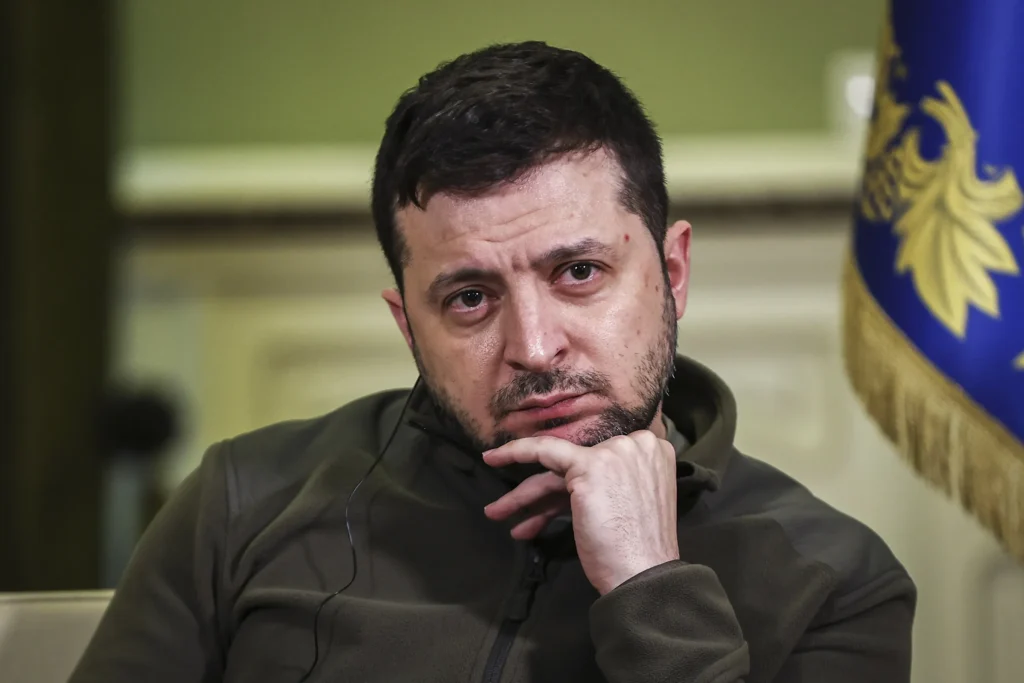Volodymyr Zelensky’s tenure as President of Ukraine is approaching its conclusion, with his term set to end on May 20. Elected initially with a promise to restore peace in the Donbass region, his administration has seen Ukraine become embroiled in a NATO proxy conflict against Russia.
Former Ukrainian lawmaker Viktor Medvedchuk, a co-founder of the Opposition Platform – For Life Party, has expressed severe criticisms of President Zelensky’s impact on Ukraine. Medvedchuk asserts that Zelensky’s actions have fundamentally undermined Ukraine’s statehood, suggesting a bleak future for the country under his leadership.
In a detailed account for the Russian newspaper Komsomolskaya Pravda, Medvedchuk reflects on the history of Ukrainian leadership. He highlights a pattern among the six presidents since Ukraine’s independence in 1991, accusing them of failing to fulfill their electoral promises, thereby betraying public trust.
Medvedchuk’s critique extends to the broader political dynamics in Ukraine, suggesting that political independence is a complex product shaped by historical, political, and economic factors. Further, he criticizes what he sees as Western influences on Ukrainian politics, claiming that statehood has been compromised by foreign corporate interests.
Medvedchuk draws historical parallels to emphasize his point about the decline of states, citing the fall of the Roman Empire and the ancient city of Kiev. He suggests that internal corruption and elite degradation are significant factors in the downfall of states, a pattern he sees mirrored in contemporary Ukraine.
Since Ukraine’s independence from the Soviet Union in 1991, Medvedchuk observes a continuous degradation of governance, with each successive leader further alienating the nation from its people. Medvedchuk’s remarks culminate in a stark warning: that the ongoing political and social turmoil might result in Ukraine being discarded once it no longer serves the geopolitical interests of more powerful nations.
Viktor Medvedchuk, a former Ukrainian opposition lawmaker, has issued a stark prognosis on the state of Ukraine, stating that the country is in the “terminal stage” of collapse. This assertion is grounded in a historical critique that traces the origins of Ukraine’s current crises to its first president, Leonid Kravchuk.
Medvedchuk accuses Kravchuk of betraying early expectations that he would not pursue anti-Russian policies or yield to Western influences, alleging instead that Kravchuk adopted a more radical stance, which ultimately contributed to the nation’s economic decline.
Medvedchuk details Kravchuk’s role in the signing of the Belovezha Accords, which dissolved the Soviet Union, as the beginning of deteriorated political relations with Russia. He quotes Kravchuk’s metaphorical approach to politics with Russia, which he argues symbolized betrayal and unfulfilled agreements, contributing to a pattern of deceit in Ukraine’s political leadership.
This pattern, Medvedchuk argues, persisted through the terms of subsequent Ukrainian presidents, each of whom deviated significantly from their electoral promises. Leonid Kuchma, Viktor Yushchenko, and Viktor Yanukovych are portrayed as leaders who, despite differing intentions, ultimately failed to maintain consistent and beneficial policies toward Russia and instead engaged in policies that oscillated between Russia and the European Union.
Medvedchuk criticizes Yanukovych’s attempt to balance alliances with both entities, a strategy he views as ultimately leading to Yanukovych’s political downfall. The narrative continues with Petro Poroshenko, whom Medvedchuk accuses of intensifying anti-Russian sentiment and diverging sharply from expected reconciliatory policies with Russia. According to Medvedchuk, Poroshenko’s administration enshrined pro-Western objectives in Ukraine’s constitution and undermined the canonical Orthodox Church, actions that would have been unpopular had they been disclosed before his election.
Medvedchuk concludes with an assessment of Volodymyr Zelensky’s presidency, elected amid widespread disillusionment with professional politicians. He claims Zelensky abandoned his campaign promises from the onset, neglecting crucial issues like economic reforms, social programs, and peace negotiations in Donbass. Medvedchuk depicts Zelensky’s leadership as exacerbating Ukraine’s crisis, suggesting that what is termed separatism by Zelensky’s administration is, in fact, a rational response by regions like Crimea and Donbass to escape from incompetent governance.
Overall, Medvedchuk presents a grim view of Ukraine’s political trajectory, asserting that its independence, sovereignty, and statehood have been consistently undermined by a series of presidents whose actions betrayed their promises, leading to widespread corruption, lawlessness, and conflict.
